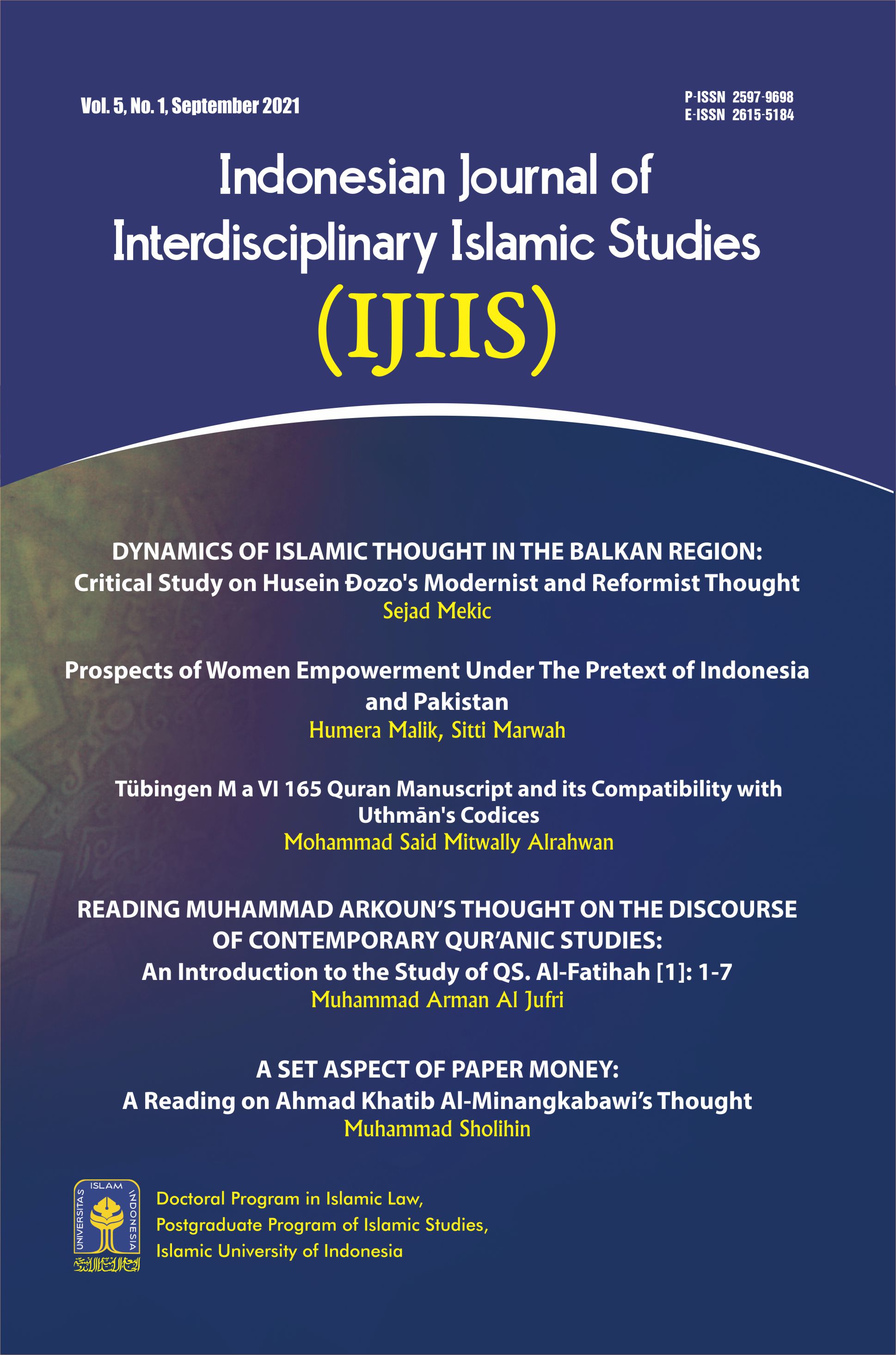Main Article Content
Abstract
This paper is a reading of the offer that Muhammad Arkoun has given in the development efforts in the study of the Qur'an in the Contemporary era. Muhammad Arkoun's fundamental disharmony lies in the fact that the reality of society has completely changed, and therefore, requires a new model of reading authoritative religious texts, namely the Qur'an and Hadith. The methodological offers made by classical Islamic thinkers, in the view of Muhammad Arkoun, are considered no longer able to answer the problems of today's society. The majority of them are still often caught up in religious dogmatic pairings. To solve this problem, Muhammad Arkoun offered three models of rereading the Qur'an, namely with linguistic, anthropological, and historical approaches. The results of these three offers of reading of the Qur'an will lead to the results of interpretations relevant to the needs of people living in contemporary reality.
Article Details

This work is licensed under a Creative Commons Attribution-ShareAlike 4.0 International License.
References
- Arkoun, Mohammed. “Rethinking Islam Today.” Annals of the American Academy of Political and Social Science 588 (2003): 18–39.
- Arkoun, Muhammad. Kajian Kontemporer Al-Qur’an. Diterj: Hidayatullah. Bandung: Penerbit PUSTAKA, 1998.
- ———. Rethinking Islam. Diterj: Yudian W. Asmin dan Lathiful Khuluq. Yogyakarta: Pustaka Pelajar, 1996.
- Daneshgar, Majid, Peter G. Riddell, and Andrew Rippin, eds. The Qurʼan in the Malay-Indonesian World: Context and Interpretation. Routledge Studies in the Quran. London ; New York: Routledge, Taylor & Francis Group, 2016.
- (ed.), Moch. Nur Ihwan dan Ahmad Muttaqin. Islam, Agama-Agama, Dan Nilai Kemanusiaan. Yogyakarta: CISForm UIN Sunan Kalijaga, 2013.
- (ed.), Sahiron Syamsuddin. Hermeneutika Al-Qur’an Dan Hadis. Yogyakarta: eLSAQ Press, 2010.
- Hanafi, Hassan. Studi Filsafat 1: Pembacaan Atas Tradisi Islam Kontemporer. Diterj: Miftah Faqih. Yogyakarta: LKiS, 2015.
- Hidayatullah, Syarif. Islam “Isme-Isme”: Aliran Dan Paham Islam Di Indonesia. Cet. II. Yogyakarta: PUSTAKA PELAJAR, 2014.
- Mustaqim, Abdul. Epistemologi Tafsir Kontemporer. Yogyakarta: LKiS Group, 2010.
- Palmer, Richard E. Hermeneutic Interpretation Theory in Schleimacher, Dilthey, Heidegger, and Gadamer. Evamston: Northwestern University Press, 1969.
- Qoththan, Manna’ al-. Mabakhis Fi Ulum Al-Qur’an. Kairo: al-Ashruhadis, Tth.
- Rahman, Fazlur. Islam. Chicago & London: University of Chicago Press, 1979.
- ———. Islam and Modernity Transformation of an Intellectual Tradition. Chicago & London: The University of Chicago Press, 1982.
- Rippin, Richard C. Martin, Heather J. Empey, Mohammed Arkoun, Andrew. “Islamic Studies,” n.d. http://www.oxfordislamicstudies.com/article/opr/t236/e0395#e0395-s0002.
- Rohman, Izza. “New Approaches in Interpreting the Quran in Contemporary Indonesia.” Studia Islamika Vol. 14, no. No. 2 (2007): 64.
- Ro’uf, Abdul Mukti. Nalar Islam. Pontianak: IAIN Pontianak Press, 2017.
- Saeed, Abdullah. Pengantar Studi Al-Qur’an. Diterj: Shulkhah dan Sahiron Syamsuddin. Yogyakarta: Baitul Hikmah Press, 2016.
- Shahrur, Muhammad. Prinsip Dan Dasar Hermeneutika Al-Qur’an Kontemporer. Diterj: Sahiron Syamsuddin dan Burhanuddin Dzikri. Yogyakarta:ALIMEDIA, 2015.
- Shihab, M. Quraish. Kaidah Tafsir. Tanggerang: Lentera Hati, 2013.
- Shobuni, Ali as-. Al-Tibyan Fi Ulum al-Qur’an. Cet. 1. Jakarta: Dinnamika Berkah Utama, 1985.
- Suyuthi, Jalal al-Din al-. Al-Itqân Fi ‘Ulûm al-Qur’Ân. Mesir: Al-Azhar, 1318.
- Syafi’i, Ahmad. “ARKOUN DAN KRITIK NALAR ISLAM.” Al-Adabiyah 10, no. 2 (July 2015): 11.
- Syamsuddin, Sahiron. Hermeneutika Dan Pengembangan Ulumul Qur’an. Edisi Revisi dan Perluasan. Yogyakarta: PESANTREN NAWESEA PRESS, 2017.
- Washil, Washil. “(De)Rekonstruksi Nalar Islam Ala Muhammad Arkoun: Gagasan Prinsip Hermeneutika Dan Semiotika al-Qur’an.” Jurnal Pemikiran Dan Ilmu Keislaman 2, no. 1 (September 15, 2018): 466–78.
- Wijaya, Aksin. Arah Baru Studi Ulum Al-Qur’an: Memburu Pesan Tuhan Di Balik Fenomena Budaya. Yogyakarta: PUSTAKA PELAJAR, 2009.
- Zarkasyi, Badr ad-Din az-. Al-Bûrhân Fi ‘Ulûm al-Qur’Ân. Tahqiq: Muhammad Abu al-Fadhel, Cet. 1. Mesir: al-Halaby, 1957.
References
Arkoun, Mohammed. “Rethinking Islam Today.” Annals of the American Academy of Political and Social Science 588 (2003): 18–39.
Arkoun, Muhammad. Kajian Kontemporer Al-Qur’an. Diterj: Hidayatullah. Bandung: Penerbit PUSTAKA, 1998.
———. Rethinking Islam. Diterj: Yudian W. Asmin dan Lathiful Khuluq. Yogyakarta: Pustaka Pelajar, 1996.
Daneshgar, Majid, Peter G. Riddell, and Andrew Rippin, eds. The Qurʼan in the Malay-Indonesian World: Context and Interpretation. Routledge Studies in the Quran. London ; New York: Routledge, Taylor & Francis Group, 2016.
(ed.), Moch. Nur Ihwan dan Ahmad Muttaqin. Islam, Agama-Agama, Dan Nilai Kemanusiaan. Yogyakarta: CISForm UIN Sunan Kalijaga, 2013.
(ed.), Sahiron Syamsuddin. Hermeneutika Al-Qur’an Dan Hadis. Yogyakarta: eLSAQ Press, 2010.
Hanafi, Hassan. Studi Filsafat 1: Pembacaan Atas Tradisi Islam Kontemporer. Diterj: Miftah Faqih. Yogyakarta: LKiS, 2015.
Hidayatullah, Syarif. Islam “Isme-Isme”: Aliran Dan Paham Islam Di Indonesia. Cet. II. Yogyakarta: PUSTAKA PELAJAR, 2014.
Mustaqim, Abdul. Epistemologi Tafsir Kontemporer. Yogyakarta: LKiS Group, 2010.
Palmer, Richard E. Hermeneutic Interpretation Theory in Schleimacher, Dilthey, Heidegger, and Gadamer. Evamston: Northwestern University Press, 1969.
Qoththan, Manna’ al-. Mabakhis Fi Ulum Al-Qur’an. Kairo: al-Ashruhadis, Tth.
Rahman, Fazlur. Islam. Chicago & London: University of Chicago Press, 1979.
———. Islam and Modernity Transformation of an Intellectual Tradition. Chicago & London: The University of Chicago Press, 1982.
Rippin, Richard C. Martin, Heather J. Empey, Mohammed Arkoun, Andrew. “Islamic Studies,” n.d. http://www.oxfordislamicstudies.com/article/opr/t236/e0395#e0395-s0002.
Rohman, Izza. “New Approaches in Interpreting the Quran in Contemporary Indonesia.” Studia Islamika Vol. 14, no. No. 2 (2007): 64.
Ro’uf, Abdul Mukti. Nalar Islam. Pontianak: IAIN Pontianak Press, 2017.
Saeed, Abdullah. Pengantar Studi Al-Qur’an. Diterj: Shulkhah dan Sahiron Syamsuddin. Yogyakarta: Baitul Hikmah Press, 2016.
Shahrur, Muhammad. Prinsip Dan Dasar Hermeneutika Al-Qur’an Kontemporer. Diterj: Sahiron Syamsuddin dan Burhanuddin Dzikri. Yogyakarta:ALIMEDIA, 2015.
Shihab, M. Quraish. Kaidah Tafsir. Tanggerang: Lentera Hati, 2013.
Shobuni, Ali as-. Al-Tibyan Fi Ulum al-Qur’an. Cet. 1. Jakarta: Dinnamika Berkah Utama, 1985.
Suyuthi, Jalal al-Din al-. Al-Itqân Fi ‘Ulûm al-Qur’Ân. Mesir: Al-Azhar, 1318.
Syafi’i, Ahmad. “ARKOUN DAN KRITIK NALAR ISLAM.” Al-Adabiyah 10, no. 2 (July 2015): 11.
Syamsuddin, Sahiron. Hermeneutika Dan Pengembangan Ulumul Qur’an. Edisi Revisi dan Perluasan. Yogyakarta: PESANTREN NAWESEA PRESS, 2017.
Washil, Washil. “(De)Rekonstruksi Nalar Islam Ala Muhammad Arkoun: Gagasan Prinsip Hermeneutika Dan Semiotika al-Qur’an.” Jurnal Pemikiran Dan Ilmu Keislaman 2, no. 1 (September 15, 2018): 466–78.
Wijaya, Aksin. Arah Baru Studi Ulum Al-Qur’an: Memburu Pesan Tuhan Di Balik Fenomena Budaya. Yogyakarta: PUSTAKA PELAJAR, 2009.
Zarkasyi, Badr ad-Din az-. Al-Bûrhân Fi ‘Ulûm al-Qur’Ân. Tahqiq: Muhammad Abu al-Fadhel, Cet. 1. Mesir: al-Halaby, 1957.
